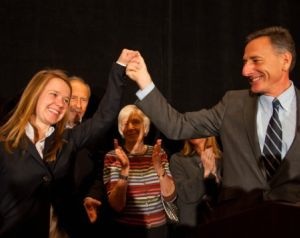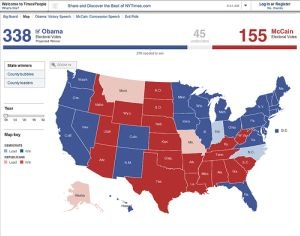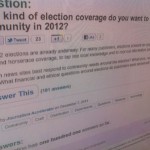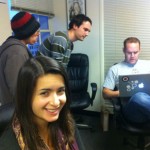Blog:
Election 2012: Are local publishers the secret weapon?

Vermont election coverage courtesy of VTDigger.com.
What kind of 2012 election coverage do you want to bring your readers? Next week the JA presents a curated online forum designed to help maximize the yield of local election coverage by exploring tools, techniques and collaborations aimed at deeper community engagement. We’ll talk about money too – advertisers are increasingly training their campaign dollar eyes online, and some non-profit journalism sites that won’t touch any ads are having trouble getting tax-exempt status.
Vermont Digger’s Anne Galloway experimented last year, creating a special election section and using Cover It Live to feed information from everywhere to Digger readers. She told me the site:
…got a huge response – now other news sites in the state are using it. We ended up with two times as many people on our site that night as usual. And it was really fun!
She also remembers:
It was a huge amount of effort – we were up late and worked our asses off.
For many publishers, elections are an opportunity to cement their roles and relationships within their community. Even national races can turn on local attitudes, and elections showcase the need for accurate, easily available information. What you know – or don’t – when you cast your ballot on Election Day can affect things that touch you directly every day. Things like roads, schools, water bills, parks, health care, and government integrity.
We’re asking how local news sites – the whole range of types – can best connect with their communities around next year’s elections, and get the most yield from their work. Publishers, journalists, researchers, data visualizers, tool developers, advertisers and other smart folks will all be part of the conversation. We’re taking an unconference approach: the forum takes place over three days, December 7, 8 and 9. Each day starts with a “live chat” window (11 AM to 1 PM Pacific) then continues afterwards, just at a more leisurely pace. It’s open to all, and the conversation will respond to the questions and experience participants bring.
We have targeted a few areas of intense interest for a starting focus each day:
- December 7: Editorial tools, tips and resources.
- December 8: Collaboration models and cross network opportunities.
- December 9: Money, elections, and hyperlocals.

Election night results 2010.
How to take part is offered below. To put the forum together, we talked with a number of news practitioners, including Laura Frank, executive director of iNews, Colorado’s investigative news network; Michael Skoler, PRI’s VP of interactive, and Michelle Godfrey, social media manager at PRI, both working on the State Integrity Investigation; Andrew Haeg, co-founder of the Public Insight Network, now expanding its reach by acquiring Spot.us; Dick O’Hare and Elizabeth Harrington, leaders of the hyperlocal ad marketplace Local Yokel Media; David Boardman, executive editor of the Seattle Times; Jim Brady, editor in chief of the Journal Register Company; David Hirschman, co-founder of Street Fight; Michael Wood-Lewis, founder of Front Porch Forum; Adelaide Kimball, board member of Project Vote Smart and the project’s national director Kristen Vicedomini; Michele Mclellan, Block by Block; founder, Kevin Davis, chief executive officer of Investigative News Network and others.
Here’s a sample of issues, context, questions and opportunities that emerged over the course of our interviews:
- “People trust factual data. That has a huge impact on people who feel better about showing up to vote.”
- “Many publishers face a lack of resources to do sustained work. How might a network approach to money, sources, and access to data change that?”
- “We approach coverage from the view of what needs to be done no one else can do. We could go get all donation records, for example, and break it down for everyone. On the community side, their strength is reaching out to people, humanizing stories. There are ways to collaborate.”
- “The more authentic and original the content – good design, journalistic integrity – those shops are getting the followers.”
- “So much of election coverage is about the horserace, and personality. But government is more about governance. We’re trying to bring some reality to election coverage.”
- “We are getting people to care about local issues. I think that’s one of our biggest threats to democracy – reality TV, Facebook, texting, people spending huge amounts of time recreating instead of paying attention to what’s going on around us.”
Bring your own questions, hopes, experience and insights, connect with others in your field, explore new opportunities the election offers.
HOW?
- Bookmark the forum dates on your calendar, and join in the conversation.
- You can join the community ahead of time at www.journalismaccelerator.com.
- You participate by posting to the comment thread.
- You’re alerted to new comments by email.
We look forward to having you in the mix and hearing your point of view!











Weigh In: Remember to refresh often to see latest comments!
6 comments so far.
-
 Emily Harris says:
Emily Harris says:
December 7, 2011 at 4:56 pm
-
 Emily Harris says:
Emily Harris says:
December 7, 2011 at 10:58 am
-
 Michelle Powers Godfrey says:
Michelle Powers Godfrey says:
December 7, 2011 at 10:57 am
-
 Janet Lewis Saidi says:
Janet Lewis Saidi says:
December 5, 2011 at 3:48 pm
-
 Michael Skoler says:
Michael Skoler says:
December 1, 2011 at 4:25 pm
-
 Lisa Skube says:
Lisa Skube says:
December 6, 2011 at 8:30 am
| ParticipantsGreat conversation Wednesday! A quick summary:
*Tons of ideas on engaging communities around election coverage. (A fav: a “news and brews” community post-election debrief.)
*An excellent list of questions hyperlocals should ask about any shiny new tool.
*Lots of specific resources to help with election coverage.
*Loads of examples of different ways hyperlocals are planning coverage.
Other topics included: how to measure success and impact, the value of covering bottom of ticket races, how to get beyond horserace coverage, how to make financial information about candidates relevant to voters, and what topics will drive 2012 local coverage.
Laura Frank of iNews set the stage for tomorrow:
“I think that while the journalism crisis means there are fewer journalists to dig deeper on stories, the other side of that coin is some journalism organizations are really thinking more carefully about how to best use their resources – and collaborate to leverage those resources.”
See you Thurs!
The conversation’s started on 2012 election coverage! Join in!
Looking forward to a great panel discussion today. Thanks for hosting today, Lisa, Ellen and the rest of the Journalism Accelerator team.
Hello Michael and fellow journalism accelerators … We’ll be listening and weighing into the discussions from here at the Missouri School of Journalism newsrooms as well … looking forward to the brainstorm!
I look forward to participating next week. You’ve lined up some terrific topics and people.
Hey Janet & Michael!
Thanks for dropping by. Here’s a little more on the particulars on some of the confirmed participants joining in this week:
December 7 – Wed: Editorial tools, tips and resources:
Some participants include: Mary Turck (Twin Cities Daily Planet), Brian Wheeler (Charlottesville Tomorrow), Andrew Haeg (Public Insight Network), Laura Frank (I-News Colorado)
December 8: Collaboration tools and networking models.
Some participants include: Matthew Barry (National Neighborhood Indicators Partnership/Citizen Atlas), Ben Berkowitz (SeeClickFix), Trevor Aaronson (Florida Center for Investigative Reporting) and Teresa Wippel (My Edmonds News)
December 9: Money, elections, and hyperlocals.
Some participants include: Elizabeth Harrington and Dick O’Hare (Local Yokel Media), Ben Ilfeld (Sacramento Press), Kevin Davis (Investigative News Network)
Looking forward to having you all in the conversation, our first experiment of an “online unconference.” Can’t wait!